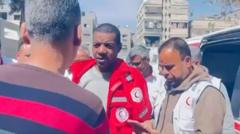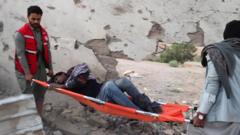Assad al-Nassasra, a Palestinian paramedic, has been released after spending 37 days in Israeli detention following an attack that killed multiple emergency workers. The Palestinian Red Crescent Society criticized the Israeli military's report on the incident, calling it an attempt to justify a war crime.
Gaza Paramedic Released After Detention Amidst Ongoing Conflict

Gaza Paramedic Released After Detention Amidst Ongoing Conflict
The release of paramedic Assad al-Nassasra highlights the challenges faced by emergency responders amid escalating violence in Gaza.
The Palestinian Red Crescent Society (PRCS) announced the release of Assad al-Nassasra, a paramedic who had been detained by Israeli forces for 37 days. His disappearance followed a deadly incident in southern Gaza on March 23, during which Israeli troops killed 15 emergency workers, prompting anger and calls for accountability.
Al-Nassasra was initially missing for three weeks until the International Committee of the Red Cross confirmed his whereabouts in Israeli detention. Reports indicate he was one of ten detainees freed at an Israeli border crossing on Tuesday. The Israeli military has not commented on his release but previously acknowledged holding al-Nassasra during a debriefing regarding the aforementioned attack, which it attributed to "professional failures."
The PRCS condemned the military's findings, labeling them a "distortion of the truth" meant to protect soldiers from accountability. The deadly attack in Rafah resulted in the deaths of eight PRCS paramedics, six Civil Defence responders, and one employee from the UN agency for Palestinian refugees (UNRWA). Survivors of the attack claimed that their ambulances were clearly displaying emergency lights at the time of the incident, contradicting the military's initial assertion that they were operating "suspicious vehicles."
As Israel continues its military operations targeting Hamas in response to the October 7 cross-border attacks, the humanitarian situation in Gaza is dire. According to figures from Gaza’s Hamas-run health ministry, over 52,000 people have died in the ongoing conflict, with casualties continuing to rise as air and artillery strikes persist across the territory.
Additional reports indicate a blockade on humanitarian aid supplies, intensifying shortages of food, medications, and fuel for the 2.1 million residents in Gaza. The United Nations has called for a response to prevent humanitarian disaster, insisting that the circumstances amount to a violation of international law.
The conflict's complexities deepened with calls from UN officials urging international action to prevent further deterioration of living conditions for Palestinian civilians, emphasizing that collective punishment and starvation as methods of warfare constitute war crimes.

















